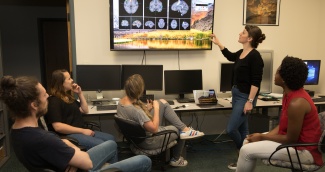
Current Students
Graduate students in the Department of Psychological & Brain Sciences are expected to complete their degree in five to six years.
Time beyond Advancement to Candidacy is primarily devoted to research. Specific requirements vary by program. Detailed descriptions of all requirements, milestones, and deadlines can be found in the Degree Requirements section.
You can find links to the Current Course Schedule & Office Hours for all instructors and TAs, the assigned Proctor Schedule for upcoming exams, the Projected Course Offerings and the description of all our Special Topics courses for the upcoming academic year.
Please check back regularly if you don't see the PDF you're looking for. The PDFs will get posted as the information gets finalized and becomes available.
For information regarding all UCSB courses, please see the UCSB Course Catalog.
During the first two years, students take classes, complete research projects, and give an oral presentation. After students pass qualifying exams at the beginning of the third year, they have more flexibility in their schedule and typically begin to devote more time to research and dissertation activities.
Financial Information
The Department of Psychological & Brain Sciences is committed to providing financial support for all qualified graduate students in our programs through competitive support packages. The department typically guarantees a minimum of 13 quarters (through fall of the 5th year) of financial support to all students in the Ph.D. program. Students may receive some combination of an assistantship, fee fellowship, and fellowship stipends. The Department will also usually supplement the above support with a small stipend at the beginning of the year to be used for resources such as conference travel, research equipment, professional development, etc.
Quarterly teaching assistantships (TA) and graduate student research (GSR) assistantships are the most common forms of support for students. Both assistantships provide a monthly salary, payment of in-state fees, and health insurance benefits. A research assistantship at 35% time or more will also pay nonresident tuition (required of students who are not residents of California). Typically, students that are given teaching assistantships will have their nonresident tuition paid for as well. Nonresident students are required to declare California residency after their first year.
UCSB offers many opportunities for funding for graduate students and all students should familiarize themselves with the information concerning money matters on the Student Affairs' Money Matters page.
The department also has PBS Travel Award for the 2025-26 academic year. In order to be eligible for a PBS Travel Award, you must meet the following criteria:
- Present at a conference between 7/1/25 and 6/30/26
- Itemize your expenses
- Endorsement verification from your faculty PI
- In exceptional circumstances, students may request this funding for other professional development needs (e.g., attending a training course, job shadowing, etc.) with the approval of their faculty PI. PBS will review these requests on a case-by-case basis.
Stipends will be distributed to you via the normal distribution mechanisms the quarter in which you are attending the conference. The deadline to submit a request is June 1, 2026. If you would like to apply for funding, please fill out this survey.
All students are encouraged to apply for fellowships offered by outside agencies, including:
- American Psychological Association
- Ford Foundation
- National Science Foundation
- U.S. Public Health Service
For complete information on financial options as a graduate student, visit the Graduate Division pages.
Interdisciplinary Emphases & Certificate Programs
Graduate students in the department may take advantage of several interdisciplinary emphases to enhance their education by acquiring perspectives and skills that supplement their training in Psychological and Brain Sciences. The graduate emphases currently available to students in the department are Cognitive Science, Quantitative Methods in the Social Sciences, Technology and Society, and Environment and Society. In addition, a Certificate in College and University Teaching (CCUT) program is offered for students who wish to acquire superior competence and experience in preparation for teaching at the university or college level. Finally, students can participate in an interdisciplinary program in Dynamical Neuroscience, an interdisciplinary field that is focused on the study of how the nervous system generates perception, behavior, and cognition. Each of these programs has specific requirements that are in addition to the requirements for the Ph.D. in Psychology that can be viewed by clicking the relevant links below.
Interdisciplinary Emphases
- Bioengineering Emphasis
- Cognitive Sciences Emphasis
- Environment and Society
- Quantitative Methods in the Social Sciences
- Technology and Society Emphasis